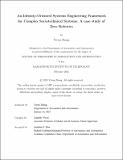| dc.description.abstract | Historical and ongoing discrimination of certain identity groups such as by racial, gender, social class, and other differences leads to persistent inequalities in various fields of society including socioeconomic, health system, political powers, education opportunities, etc. Technology however often entrenches or sustains the hierarchies and further strengthens these social inequalities. While there are many frameworks for studying complex systems, a framework with a focus on advancing social justice and an integration of technological and social considerations is missing. This work introduces the Intersectional Antiracist Technology Framework as a new tool and applies it to an existing complex system of Zero Robotics in STEM education. STEM education, with increasing importance in the modern world’s competitions, is one of the most popular methods to cultivate students’ interests and capabilities in solving complex problems. However, the disparities in access to quality STEM learning opportunities and inclusion in STEM activities remain significant challenges in promoting social equality. This work builds upon the systems engineering tools and uses the innovative Intersectional Antiracist Technology Framework to describe, explain, and evaluate an existing complex system of Zero Robotics. Zero Robotics is an education outreach program that is designed as an early intervention to enroll students in aerospace and related fields. The program aims to serve students across the pipeline and provide them with learning opportunities through interactions with a space robot. It is a perfect example of a complex sociotechnical system that has technological and social factors. Through the case study of Zero Robotics, data are collected through interviews, surveys, participant observation, and available documents. Qualitative program outcomes are assessed from student surveys before and after the Zero Robotics competition. This work is the first attempt to apply the Intersectional Antiracist Technology Framework to an existing complex system that is being managed by the author. The findings from this study demonstrate insights that can be gained about complex, sociotechnical systems by viewing them from multiple Stakeholder perspectives and blending the information about the technical and social design aspects. | |
